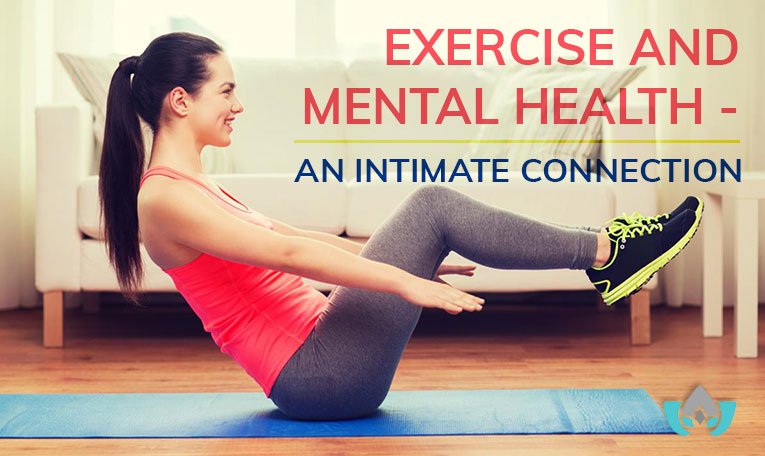
We’ve all heard at one point or another that exercise is good for you.
Whether it be breaking a sweat, getting your heartrate up, or picking up some weights, it’s common knowledge that exercise is essential in our physical upkeep.
However, physical health is not the only health that may be affected by exercise.
If you want to find out how exercise and mental health are closely connected, continue reading.
Why Is Exercise So Important?
As mentioned before, exercise is a primary part of maintaining our physical health.
In prehistoric times, food wasn’t as easy to come by as it is now, so our bodies evolved to store nutrients from our food away in the form of fat.
Our ancestors had to adapt to store away food in such a way that allowed them to travel long distances between meals.
Nowadays, we’re lucky to have easier access to food, but the benefit of that easy access comes with the detriment of not having to exercise.
Although the idea of not having to exercise for your food might seem great, our bodies still need to balance out our food intake with adequate exercise.
Without it, our bodies will end up storing too much of the food we eat instead of burning it off, which in turn upsets many of the intricate balances our bodies have to maintain in order to stay healthy.
Knowing this, it’s no surprise that mental health is affected by how much exercise we get.
Does It Matter What Type Of Exercise?
Many people get stuck on the type of exercise they think they should be doing.
For instance, many people think that attaining physical health only comes from the ability to run long distances, and so they turn to jogging for their form of exercise.
Inevitably, jogging doesn’t stick for many people and they might give up.
Fortunately, most aerobic activity treats the body the same way; for instance, jogging, swimming, and cycling all can be beneficial modes of exercise.
Not only that, strength and resistance training can also do to your body similar things as aerobic exercise as well.
In other words, it really doesn’t matter what type of exercise you do, so long as you’re exercising.
If you’re training for a specific sport or activity, you can get into all the different ways there are to optimize your fitness routine.
But if you’re just exercising to stay healthy, don’t overthink it – any exercise is better than no exercise.
How Exercise Supports Mental Health
Now, as easy as it is to believe that exercise helps us keep our food intake and storage balance in check, it might come as a surprise that exercise can help mental health immensely.
To be specific, high-intensity activities encountered during exercise improve the way we perceive ourselves, as well as improve the way we are able to think logically and conceptually.
This is because during exercise, you breathe faster and your heartbeat elevates.
This increases the amount of oxygen delivered to your entire body, including your brain, which can in turn give the brain a chance to refresh itself of its most important neurotransmitters.
Even just 20 minutes of higher than usual intensity activity like going for a brisk walk 3 times a week can show improvements to your mental health.
This means that even if conventional methods of exercise typically found in a gym don’t appeal to you, there’s something out there that you’ll enjoy.

Exercise For People Who Hate Exercise
If you’re not a huge fan of the idea of going to the gym, or don’t feel like running around the block is your cup of tea, there’s still other things you can do that are just as beneficial to your mental health.
Here are some activities you might not have considered or might not have realized do just as much for you as lifting weights might.
1. Yoga
Yoga is unique when it comes to exercise because it involves not just physical practices.
Yoga actually refers to a combination of physical, mental, and spiritual practices that can be found in different balances depending on the school of yoga you find.
It should then come to no surprise that yoga, with its physicality as well as its roots in meditation, can be a great choice for exercise for maintaining mental health.
2. Cycling
For those of you who dislike walking or running, cycling can be another great option.
Because cycling places less strain on your knees, it can be a popular alternative for exercise that still allows you to experience the outdoors.
Even if you dislike the idea of going outside, most gyms that have running machines will also have cycling machines as well.
And if you don’t like the gym, there are always lots of second hand exercise bikes for sale on Craigslist.
3. Swimming
If you find getting hot and sweaty during exercise to be a reason you avoid it, swimming might be a great alternative for you.
Because there’s less pressure on your joints, many people find this form of exercise particularly soothing, especially when you can reward yourself at the end by taking a dip in the hot tub.
You’d be surprised by the price, too; memberships at your local pool are often cheaper than your typical gym membership.
4. Dancing
Maybe what’s stopping you from exercise is the repetitive nature of it.
If that’s the case, dancing is your perfect solution.
Dancing in its many shapes and forms provides a wonderful outlet for people to express themselves to the types of music they already enjoy listening to.
The best part is that because you’re learning throughout the exercise, time flies by and you’ll even have a routine to take home with you most of the time.
5. Walking
For some of us, exercise might just seem like more stress on top of an already stressful lifestyle.
Walking can surprisingly be just as beneficial as other forms of exercise provided you maintain a steady and brisk pace.
You can even take some music or a podcast on the road to keep yourself entertained when you’re walking on your own, or you can always bring a friend or two and explore your neighborhood together.
This article was originally posted on the blog of The Mindful Healing Clinic. It appears here on Steemit with the full permission of the original source